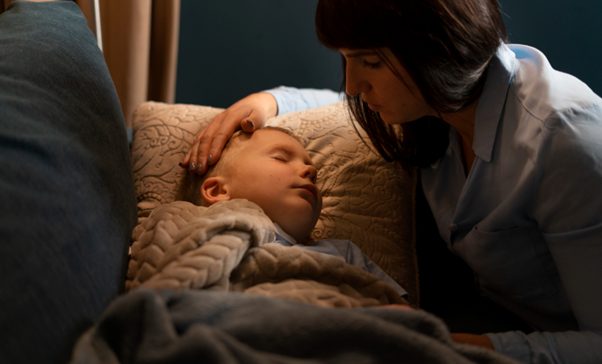When it comes to children, as parents we often find ourselves in a situation where we are trying to convince our child to go to bed. “Oh, just five more minutes please!” This can be heard in many homes over the years. However, current studies indicate that putting the preschool child to bed early is not simply a convenience for the parent but rather an important aspect of the child’s growth. So why is putting your children to bed early such a great idea when it comes to their overall development and health?
Table of Contents:
- Early Bedtime Benefits
- Best Bedtimes for Kids
- Good Sleep Habits
- Effects of Poor Sleep
Early Bedtime Benefits
There are other positive effects of early bedtime for preschoolers not only in getting parents some free time in the evening. Actually, it’s a gift that you will be able to use at every stage of your child’s development.
First of all, going to bed earlier is good for getting more overall sleep at night. Children who are put to bed early will sleep for a longer time at night and sleep is important for the child’s growth. It is also important for growth hormones that our body produces while we are asleep to support growth of bones and muscles.
Also, children who are well rested are happier children. It also has many health benefits such as early bedtimes to help control mood and behavior. A child who has had enough sleep will rarely have mood swings or have trouble in class or while at play.
Most importantly, early bedtime is most beneficial for the development of the brain. The brain organizes information that has been collected during the day and forms new memories during the night. This is especially so for preschoolers who are therefore learning a lot in a short time.
It also assists the children to have a sense of timing and know when what is expected of them for example when they are put to bed. This can also go a long way in reducing anxiety that is associated with the act of going to bed and therefore help one fall asleep easily.
Best Bedtimes for Kids
However, every child is different and sleep specialists recommend the following schedule based on the child’s age. For preschoolers (ages 3-5), the sweet spot typically falls between 6:30 PM and 8:00 PM.
The exact timing can depend on various factors:
Wake-up time:
If your child has to wake up early for preschool, their sleeping time should also be prior to that.Individual sleep needs:
Some of the children will require more sleeping hours than others naturally.Family schedule:
However, it is advisable to sleep early, there are cases where one has to shift the normal sleep time slightly for instance due to work.
Remember, consistency is key. It is advisable to keep on having the same bedtime each day even at weekends. This routine assists in establishing your child’s body rhythms which will enable him or her to sleep and wake up on his own without much difficulty.
Good Sleep Habits
It is therefore important to cultivate good sleep hygiene in the early years of one’s life so that one can be able to have good sleep hygiene in his or her lifetime. Here are some strategies to help your preschooler develop positive sleep habits:
Create a bedtime routine:
Rituals of relaxation help your child understand that is the time for relaxation. It could be a warm bath, a story book or just hugging the child and taking him to a dark quiet room.Make the bedroom sleep-friendly:
Check that the environment is free from light, noise, and maintain a good temperature. It is suggested to close the curtains or turn on the white noise makers if that is possible.Encourage physical activity during the day:
Physical activity is one way that may ensure that children get to sleep at night with so much ease. Remember though, that vigorous exercise should be avoided near bedtime, as it could be invigorating.Watch the diet:
Steer clear of big meals at night, and do not forget that caffeine is in products such as chocolate and soda.Be a good role model:
Children are likely to copy what they see their parents do. Exemplify appropriate sleep hygiene by providing a regular sleep schedule and the regimen including going to bed.
It may take your child some time to learn the new sleep pattern that is expected of him or her. It is better to be insistent and not hope to succeed at once and can meet failure at times.
Effects of Poor Sleep
As with any other facet of life, there are the advantages of getting a good night’s sleep while the disadvantages of poor sleep are equally as grim.
Insufficient sleep in preschoolers has been linked to a range of negative outcomes:
Behavioural issues:
If a child is tired, they may get angry and throw a tantrum, or have trouble listening to parents and teachers.Cognitive impairment:
Sleep deprivation affects the learners’ capacity to listen, memorize information, and learn. The above can greatly influence a child’s performance in preschool and even in the later classes.Physical health problems:
It also has been associated with higher propensity to be obese, to have a weak immune system, and even to suffer from heart diseases in the future.Emotional regulation difficulties:
If children do not get enough sleep, they may have some emotional problems such as mood swings and anxiety.Growth concerns:
I have also noted that growth hormones are secreted in the body at night. It is also possible that the lack of sleep might have serious effects on a child’s physical growth.Family stress:
This means that a child’s sleep disorders do not only hold an impact on the child. It also causes more stress for the whole family and lack of sleep at night.
These are the effects of sleep deprivation and they mostly happen when one has been sleep deprived for some time, not one night of lost sleep. Though, it is quite easy to make the child go to bed later and later each day and thereby end up having inadequate sleep.
In light of the above, it cannot be said that parents have a choice in putting their preschoolers to bed early – it is a necessity for the child. This means that by ensuring children go to bed early and encouraging positive behaviours as far as sleep is concerned, we are giving our children the best gift ever, that is, better physical health, emotional well-being and cognitive function. Although, there are days when it is quite hard to maintain the early bedtime routine for your child, it is most rewarding in the long run. Sweet dreams are for bright days and that is how your preschooler will be ready to grow and develop in all spheres of their little life.
For more such interesting blogs, Visit EuroKids















